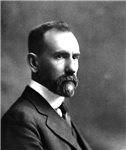
William Ambrose Shedd
William Ambrose Shedd – the author of this manuscript – was born on January 24, 1865 in the village of Seir in Northwestern Persia. His parents (John Haskell Shedd and Sarah Jane Dawes Shedd) were Presbyterian missionaries stationed in the city of Urumia, serving the Assyrian Christian population of the region. In 1870, the family moved to America and settled in Charlotte, NC, where John Haskell served at a school for freedmen and William grew up among African American children of freed slaves. In 1880, at the age of 15, he entered Marietta College, while most of his immediate family returned to Urumia, where his parents continued their missionary work under the Presbyterian Board of Foreign Missions (PBFM). However after only two years at Marietta College, he too returned to Urumia to assist his father, who was at the head of the mission station, for a period of two years, after which he returned to Marietta to complete his undergraduate studies. He again returned to Urumia in 1887 to serve as a teacher and administrator for three years. In 1889 he enrolled in Princeton Theological Seminary and after completing his advanced theological studies in 1892, he was ordained as a Presbyterian minister and designated as a missionary of the PBFM to Urumia.
After the passing of his father in 1896, Shedd’s responsibilities grew significantly. He became instrumental in assisting the growing number of refugees displaced due to rising geo-political tensions in the Turco-Persian frontier, thousands of whom eventually took shelter at the PBFM mission station facilities in Urumia under his care. Shedd had completed most of the chapters in this biography by 1912, but was unable to complete and publish this work due to illness, the humanitarian crisis in the region and his heavy mission responsibilities. In 1915 and 1916, he toured America to raise public awareness about the plight of the refugees in northwestern Persia and helped raise significant funds for their cause. The challenges of supporting the influx of refugees into Urumia came to a head during the final months of the war. In the summer of 1918, with the Ottoman invasion of Urumia, Shedd accompanied 70,000 refugees fleeing Urumia southward toward the city of Hamadan. During this exodus, he contracted cholera and passed away near the city of Sain Kala on August 8, 1918. His remains were later moved to the Armenian cemetery of Tabriz, where his gravestone still stands.
As a scholar, Shedd wrote extensively. He was well-versed in the cultures, languages and religions of the people of Persia and published numerous related scholarly articles. He also authored a book on the earliest contacts between Islam and Oriental Christianity. In addition to his published works, Shedd completed several other manuscripts, which due to his premature death were never published. Some of these manuscripts were destroyed during the events of World War One, and others survived. The Life of John Haskell Shedd is one of the survivors. In the early 1930s his younger brother, Ephraim Cutler Shedd, completed this biography by writing the final two chapters.